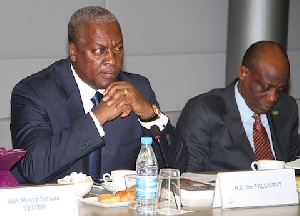The general economic condition in 2013 was challenging, with the sentiments of business and consumers mostly dour, B&FT’s review of the year has shown.
Four out of five times this year, businesses -- according to the Bank of Ghana’s regular surveys -- reported weak sentiments on the economy as the court challenge to President John Mahama’s election created uncertainty and the energy crisis inherited from 2012 slowed down economic activity.
For consumers, confidence dipped in three of the five survey rounds due to worries over rising inflation and the knock-on effect of low business confidence which reduced employment prospects.
As the year 2014 approaches, the outlook is one of uncertainty given that most of the difficulties in 2013 have not been sufficiently tackled, said senior business leaders gauged by the B&FT.
While the energy crisis has ended, consumers and businesses fret over the expected hikes in electricity and water tariffs in 2014 (the first of such hikes could be seen in January), which government has promised the utility companies to help them achieve full cost recovery.
This increases the likelihood of higher inflation, the central bank said in November, implying that monetary policy will be tight -- at least in the initial months of 2014 -- and interest rates will be kept high.
From 8.8 percent in December 2012, inflation surged to 13.2 percent in November, climbing above the central bank’s target interval of 9-11 percent. The jump was driven in the main by the removal of petroleum subsidies in February and the fall in the cedi, which increased the cost of imports.
Last month, the central bank said banks’ stance on credit was tight and that the average lending rate fell only marginally -- from 25.7 percent in December 2012 to 25.6 percent in October 2013. The survey also found that credit demand had decreased.
The poor credit demand is a worry to banks because it makes it harder to find productive use for their costly deposits, said one chief executive of a leading bank. Another concern of banks is the high exchange rate losses due to depreciation of the cedi -- which according to Ecobank Research stood at 21.7 percent from beginning of the year to December 10, 2013.
Much of the pain in the economy is the legacy of the fiscal imbalances triggered by election-motivated budget overruns in 2012, when the government’s deficit ratcheted up to a record 11.8 percent of GDP.
Worse is that the government has failed to cut the gap to a targetted 9 percent of GDP this year, setting off a series of weak sovereign creditworthiness assessments by international ratings companies.
In October, Fitch lowered Ghana’s sovereign ratings from B+ to B, and this month Moody’s narrowed the outlook on the government’s B1 sovereign bond rating to negative from stable, while Standard & Poor’s took a similar action on its B Ghana sovereign rating.
All three ratings agencies cited dissatisfaction with the pace of fiscal adjustment in 2013 and questioned the credibility of budgetary goals that have been set for 2014, among which is included a plan to trim the deficit to 8.5 percent of GDP.
Standard & Poor’s said in a statement that “the negative outlook indicates at least a one-in-three possibility that we could lower the ratings on Ghana within the next 12-18 months, due to its weakening fiscal and external profile.”
The government’s fiscal predicament has been further underscored by its proposal to freeze public sector salaries next year. President Mahama, who together with the members of his administration is giving up 10 percent of his paycheque in 2014, is hoping government workers will follow his example.
But the proposal has infuriated public sector unions, who typically use the expected average annual inflation as a basis for wage negotiations. At the heart of workers’ concerns is that a pay freeze will squeeze real wages at a time that living costs are soaring because of increases in utilities and fuel prices.
The government’s proposal reveals the dearth of resources it confronts, said Dr. Joe Abbey, the Executive Director of the Centre for Policy Analysis (CEPA) --who added that unless wage negotiations are influenced by “sober realism”, 2014 will witness another turbulent labour market.
Business News of Thursday, 26 December 2013
Source: B&FT
Report: 2013 has been challenging
Entertainment












